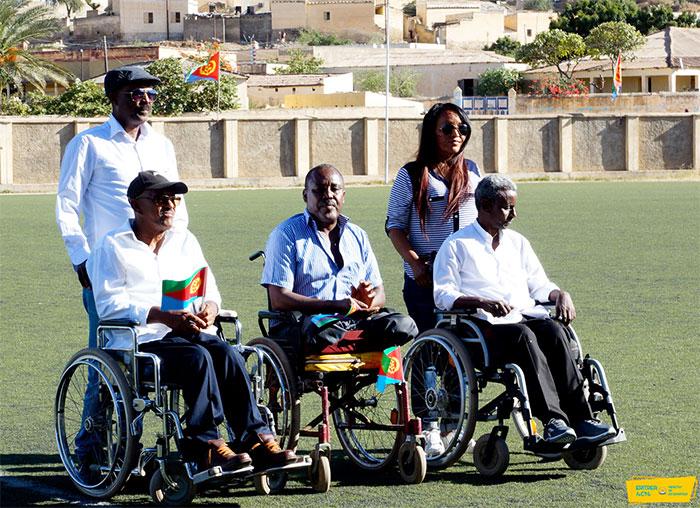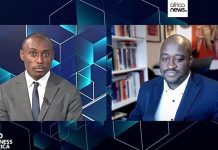Africa-Press – Eritrea. International Day of Peoples with Disability (IDPwD) was honored on Thrusday, 3 December, under the theme “Building back better toward a disability: inclusive, accessible and sustainable post COVID-19 world”. It is observed annually to increase public awareness, understanding and acceptance of people with disability and celebrate their achievements and contributions. It gives information on how to get involved in the day as an individual or organization and how to break down barriers (both structural and attitudinal) for people with disability.
According to World Health Organization, disability is any condition that makes it more difficult for a person to do certain activities or interact with the world around them. These conditions, or impairments, may be cognitive, developmental, intellectual, mental, physical or a combination of multiple factors. Disability is a contested concept, with different meanings in different communities. According to the world report on disability, 15% of the world’s population, or about 1 billion people, are affected by disability.
Disability inclusion is an essential condition to upholding human rights, sustainable development, and peace and security. Leaving no one behind is central to the promise of the 2030 Agenda for Sustainable Development. The commitment to realizing the rights of persons with disabilities is not only a matter of justice but also an investment in a common future.
The global crisis of COVID- 19 is deepening pre-existing inequalities, exposing the extent of exclusion and highlighting that work on disability inclusion is imperative. People with disabilities—one billion people— are one of the most excluded groups in the world and are among the hardest hit in this crisis in terms of fatalities.
Even under normal circumstances, persons with disabilities are less likely to access health care, education and employment and to participate in the community. An integrated approach is required to ensure that persons with disabilities are not left behind.
Persons with disabilities must be able to fulfil their role in society and participate on an equal basis with others. It is important to focus on the ability and not on the disability of an individual. Often, the societal image of persons with disabilities is impacted by attitudes based on stigma and discrimination, as well as archaic ideas about disability and persons with disabilities that are often the greatest barrier to their full and equal participation in society and development on an equal basis with others. It is important to note that disability is part of the human condition, and that all of us either are or will become disabled to one degree or another during the course of our lives.
By promoting empowerment, real opportunities for people are created. This enhances their own capacities and supports them in setting their own priorities. Empowerment involves investing in people – in jobs, health, nutrition, education, and social protection. When people are empowered they are better prepared to take advantage of opportunities, and they become agents of change and can more readily embrace their civic responsibilities.
The stigma and discrimination that disabled people face is immense, especially in underdeveloped countries. In a nation like Eritrea, despite the societal prejudice the government took a significant constructive step to accede to the convention on the rights of persons with disabilities and its optional protocol (A/RES/61/106), adopted on 13 December 2006 and opened for signature on 30 March 2007.
Importantly this reflects the firm political commitment towards ensuring that all Eritreans, regardless of whether they are disabled, can fully realize their rights without discrimination. However, it is crucial that ratification is translated into adequate and appropriate measures for implementation and enforcement, lest it becomes a hollow gesture. As a result it is necessary to change harmful societal attitudes and behaviors towards those with special needs and disabilities.
Another area of possible focus is the education sector. While the Eritrean government commendably extends free education (across all levels) to every citizen, individuals with special educational needs require further support, including a disability-friendly environment and inclusive curriculum, specially trained teachers and learning aids, amongst other measures. Inclusive education promotes tolerance, enables social cohesion and promotes equal participation within society. Furthermore, it is more cost- effective than separate schooling and institutionalization and can encourage inclusive labor markets which lead to a more efficient social economy.
Another area of focus is working hand in hand with the international community, civil society groups, concerned individuals and organizations. This cooperative movement can alienate the stereotypes over peoples with disabilities, the fact that disabled individuals are often shackled by restrictive, narrow, labels which only serve to patronize them as limited objects of pity or charity or undesirable others. Rather than view and categorize them within these narrow frames, individuals with special needs or disabilities should first be seen as human beings. Seeing them as human beings leads to viewing them as individuals to whom human rights and dignity are to be afforded.
Thus, a reformulation of the ways individuals with disability are perceived can be an influential and effective step in supporting and accepting them as empowered, efficacious, and active members of society. Likewise, during this Pandemic they really need more attention in different aspects of their lives. Taking that into consideration the Eritrea government played its role in providing all the necessary support and is still fighting to fulfill some necessary gaps. The Ministry of Health, in cooperation with other ministries, worked on giving information about COVID-19, how it is transmitted and the prevention mechanism. Consultations were given to families of the disabled and other responsible institutions on how to act and take care of them during this pandemic. For example, how to interact with a visually impaired person by keeping the social distance within a family or in a neighborhood, or how to help disabled daily workers by minimizing the frustration made by the lockdown. Providing quick health facilities like ambulances and other urgent medical services were some of the activities made during the nine-month lockdown.
Generally, the Eritrean government and relevant stakeholders can develop or expand public awareness through mass education, support of local advocacy groups or community, and encouragement of social mobilization to help reduce and eliminate social stigma and isolation specially during this pandemic of COVID-19.
With a great hope, as the world recovers from the pandemic, we must ensure that the aspirations and rights of persons with disabilities are included and accounted for in an inclusive, accessible and sustainable post COVID-19 world. This vision will only be achieved through active consultation with persons with disabilities and their representative organizations.







